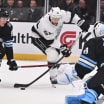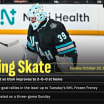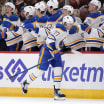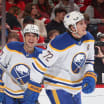Rask could get recognition he deserves following retirement from Bruins
2014 Vezina Trophy winner was backbone of defensive-minded team that reached Stanley Cup Final twice

The starting goalie for the Boston Bruins for the past decade set records on an Original Six franchise, helped push that team to the Stanley Cup Final twice (2013, 2019), and is tied for the second-best save percentage (.921) in NHL history (minimum 200 games) behind Dominik Hasek and Ken Dryden, each .922.
And yet, it didn't always feel like Rask got his due.
That's a disservice to Rask, who announced his retirement from the NHL on Wednesday, four games into an aborted attempt to return this season from surgery to repair a torn labrum in his right hip in late July. Rask will finish his 15-season NHL career, all with the Bruins, with a 308-165-66 record, .921 save percentage, 2.28 goals-against average and 52 shutouts in 564 regular-season games (544 starts). In 104 games in the Stanley Cup Playoffs, he was 57-46 with a 2.22 GAA, .925 save percentage and seven shutouts.
"Today is a day that I hoped would never come," Rask said in a statement from the Bruins. "It is with a heavy heart that I announce my retirement from the game of hockey."
He was 2-2-0 with a 4.28 GAA and .844 save percentage this season, after signing a one-year, $1 million contract Jan. 11.
Rask, the Bruins leader in wins and games played for a goalie, took them to the Stanley Cup Final twice, losing in six games to the Chicago Blackhawks in 2013 and seven games to the St. Louis Blues in 2019. Rask was the backup to Tim Thomas in 2011 when the Bruins won the Stanley Cup. He won the Vezina Trophy, voted as the best goalie in the NHL, in 2014, with a 36-15-6 record, 2.04 GAA and .930 save percentage, and is 33rd in wins in NHL history.
"One of the elite goaltenders ever in the NHL, not only with Boston," Bruins coach Bruce Cassidy said.
But that wasn't always the way he was regarded, and it was the comparison to Thomas that robbed Rask of some of the credit.
"It does bother me to some extent when I hear the criticism," goaltending coach Bob Essensa said in 2019. "Because he has been very good for a long time."
NHL Tonight on Tuukka Rask's retirement
In reaching the 2013 Stanley Cup Final, Rask was 14-8 with a 1.88 GAA and .940 save percentage, surpassing the numbers Thomas put up in 2011 (.940 save percentage, 1.98 GAA) when he won the Cup for the Bruins for the first time since 1972.
Rask's talent was evident from the start after the Bruins acquired him in a trade with the Toronto Maple Leafs for goalie Andrew Raycroft on June 24, 2006. It was deal that would alter each franchise.
"It's tough to put into words what he did for the Boston Bruins for [15 seasons]," said defenseman Torey Krug, who played with Rask from the 2013 Stanley Cup Playoffs to the 2019-20 season before signing with the Blues. "He's obviously at the top of the stats for goaltenders in one of the most storied franchises in the NHL, and his play speaks for itself.
"I think having a backbone like him, just how good he was for all those years, it gave us that confidence, and we had nothing to worry about playing in front of him because we knew he was going to show up on a nightly basis."
Rask had the benefit of playing behind likely Hockey Hall of Fame defenseman Zdeno Chara in a defensive-minded system. But it was his play in net that provided a crucial component in making the Bruins dominant in the past decade.
"I think his impact was he solidified the reputation of being a very good defensive team," Cassidy said. "You need a good goaltender to be a good defensive team. You need a culture. You need forwards that are willing to play 200-foot games, defensemen that are willing to kill penalties. A lot goes into it, but it starts usually with the goaltender."
Rask tried hard to return this season, enduring a surgery that he said was only necessary for continuing his hockey career. He rehabbed, often being seen around the Bruins practice facility before he officially re-signed with them. Ultimately, he discovered that his body was not responding the way he hoped and needed it to to be at his best, to help the Bruins try for another Stanley Cup.
So he opted for retirement.
Rask had often expressed the pleasure that he had been able to remain with one organization for his entire NHL playing career, something he called a "luxury" in 2019, and it was something he returned to in his statement.
"Through all the ups and downs, I am so grateful for all the support this team and the people of Boston have given me," he said. "I will miss everything that comes with representing the Boston Bruins. … Boston is special for so many reasons and will always be our adopted home."
So will he ever get his due?
"I'm not sure," Krug said, referencing former forward David Krejci as another Bruins player in the same situation. "It's a tough place to play. It's great, but some of those things that those guys did on any other organization, they'd be thought of as some of the greatest players to play for the organization.
"He grew that personality, and he was able to look past that and just do his thing quietly on a day-to-day basis. He was able to take those words and use them as motivation, and just play."
Rask rode that motivation into the Bruins record books, with those 308 wins, the Stanley Cup ring, the appearances in the Final. He became a great goaltender, a favorite teammate, and the backbone of a franchise over a decade, tackling records and milk crates, and mostly crediting his teammates for his success and not himself.
"Every single night he gave us a chance," Krug said of Rask's play in the playoffs. "Even the games that we didn't deserve, he stood on his head. He was our backstop. He didn't get a lot of the credit he deserved. He's got some of the best stats of all time for goaltenders. It just felt like if you scored two, you probably had a really good chance. Even if you scored one, you had a chance."

















